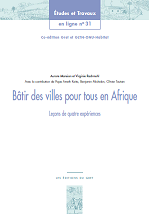Resource information
Nearly 200 million Africans currently live in slums. Urban operations are one of the main tools for improving living conditions in informal settlements, where land tenure, housing, development and services largely function outside any official system. While progress has undoubtedly been made over the last decade, these operations have had mixed social, economic, urban and environmental impacts. Crosscutting analysis of four experiences in Mauritania, Morocco, Rwanda and Senegal is used to highlight some of the problems associated with the design, implementation and monitoring of operations to improve or restructure informal settlements. Particular attention is paid to social assistance, which is an aspect of these initiatives that tends to be ignored. This paper was written for the designers, decision-makers and agencies involved in these operations, to help them ask relevant questions, understand the issues that they raise and thus deliver better services. In short, its objective is to contribute to more inclusive urban policies and practices and greater progress in building cities for all types of resident in every kind of neighbourhood.


